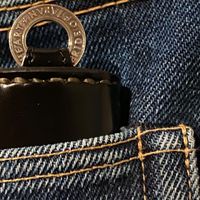Wabbidashery… aka, The Heritage Heaven Tour
-
I feel like I could/should talk about mental health some more…
So this will be the first of hopefully a few blog style posts, where I will babble a bit. Just sharing some history, observations and stories. Comments and questions are welcome. You can also ignore it if you wish.
My first diagnosed depression was about 13 years ago, but the subsequent treatment made me realise I’d suffered multiple serious episodes from when I was a child. I just didn’t know what they were.
Since that first diagnosis I’ve had four different courses of therapy and four different medical treatments. I’ve had numerous different diagnoses, different versions of depressive disorder, adjustment disorder, generalised anxiety disorder etc.
Every time I’ve been ill it has been different. The symptoms vary massively. They don’t tell you that at the start, mostly because a bout of depression is not unusual in a life and in the vast majority of cases it goes away. But if, like me, you are prone to it (likely due to a combination of trauma, genes and generational/inherited trauma), it comes back in different forms and with different symptoms.
It is very confusing because you generally don’t realise you are getting ill before you are well into self-medicating, employing coping strategies unconsciously, and making very poor decisions for yourself. All of which will ultimately make things worse, and normally result in a crisis which reveals how ill you are.
Fun!
-
@goosehd just like with baking and everything else, practice makes perfect

At first I didn’t ask for help. You get help when everything stops working. That first time 13 years ago, I lay on a couch for five days and barely ate or slept, and ignored all calls or knocks at my door. It wasn’t until work sent people round that I got help. I literally didn’t think to call in sick. Over the last few years having people who know you around helps. They can tip you off. You also learn to spot symptoms. But this last period of illness started over two years ago and I sort of didn’t know that until I was being sectioned by my GP. So go figure.
As for healthy coping strategies you need to remember the basics: Sleep. Eat. Exercise. That is not as easy as it sounds. Identify negative behaviours and either eliminate or manage them. There is an excellent theory called salutogenesis developed by a guy called Aronofsky, that looks at the science of well-being. So focusing on what makes you healthy, not sick.
Hopefully I’ll go into detail and exemplify some of the above over the next few weeks.
-
@neph93 thank you very much for your honesty and transparency. Ever since i scrolled down the first page on the forum on my first day your name was a frequent thing. We’re all human and we have the same addiction in the form of IH. But also, this feels like a family. So thanks for sharing and i wish you all of the best my man!
-
@neph93 I heard the term Inherited Trauma for the first time recently, listening to a podcast with Dr Gabor Maté. He was explaining the idea of predispositions to addiction/substance abuse being more related to generational, inherited trauma than to the physiological phenomenon of an 'addictive personality.'
This is supposedly a fringe theory in the field of psychology.. I'm not intelligent or well read enough to either critique or advocate for the theory, but it was a fascinating listen nonetheless.
-
@neph93 thanks for sharing. I’ve not been around here as long as some, but I’ve always liked the way this place handles the big stuff as well as all the other stuff. We’re all uniquely messed up but there are enough points of connection between us for me to think your thoughts and experiences will prove helpful, either directly or indirectly in helping all of us be a bit more understanding.
Also I always feel that the world is a better place when you’ve been baking – hope it has a similar effect on you

-
Wow Reuben
 looks delicious !
looks delicious ! -
Thank you for sharing all of this with us, Reuben. It’s very brave to so open on a forum such as this.
I’m so glad that we are beginning to get over the stigma associated with talking about our mental health openly. Life it too short to hide from each other.
Much love! And the wabash looks great on you.
-
Love the jacket--just got the 19oz lefty this tread is making me want this chore coat as well. Mental health is often an overlooked issue and is treated as less than serious by society. We would tell a diabetic to "get over it" but often those that suffer from mental issues are told such nonsense. I appreciate your story very much @neph93 . Respect brother.
-
-
So… a few more observations regarding living with a long term mental health issue…
As many of you know, I spent five weeks receiving treatment at a facility in the spring. The place focused on encouraging healthy patterns of living, as well as functioning as a place of learning. It was designed to maximise sleeping, eating, exercise and rest. There were eight patients in total and we were encouraged to test our limits around being social, sharing fellowship, the better to learn when it is healthy to engage with others and when it is healthy to disconnect.
We were taught to view health on a spectrum rather than as a healthy/ill binary. The more things you do that slide the scale the right way, the better. Recognising when the scale is sliding the wrong way is important. This facility was an excellent place to learn and practice these skills, the problem being that it is a sheltered, protected environment, with many real world stress factors removed. So when you get out, the task is revealed as being much, much harder.
The other problem is that pretty much everything in life is a double edged sword to the depressed mind. Most things cut both ways, and learning how to use things so you only cut away from yourself is tough. And the technique varies from case to case.
Alcohol is an typical example. Most people know that there is a relationship between booze and mental health. In an ideal world anyone with mental health issues would abstain entirely. However drinking can give relief. A certain benign escape, in the right setting. The costs don’t have to outweigh the benefits. But they do tend to, as the depressed brain will desperately want to maintain the experience of pleasure and happiness that alchohol can bring, and which is otherwise entirely lacking in life. Having unconsciously self medicated with alcohol all my life, this is something I’m working hard on.
While this is an obvious example, it also extends to food, coffee, nicotine, and really any sort of stimulant or relaxant. Even training, which many consider to be exclusively positive, can be problematic. I’ve used training earlier in my life to sublimate depression. It boosts endorphins, dopamine, adrenalin. It takes time, effort and attention. It gives purpose. It can also become obsessive and dangerous. This may lead to injury, neglection of other important aspects of life, self doubt, narcisistic tendencies, guilt when not training, shame when injured.
Another example is social contact. I love being in a positive social setting. It can be an excellent medicene against depression. But the joy and affirmation that I can experience can often lead to chasing behaviours. These inevitably lead to taking poor decisions. For example, my energy levels are lowered by social interaction, and ignoring the need for rest and alone time, and instead chasing positive experience through social interaction will set me up for a very bad time.
Obviously, balance in all things is key. The depressed brain seeks it all the time, but is spectacularly poorly equipped to achieve it. The work I’m doing now is about exploring that balance in all aspects of my life. Trying to find out what healthy behaviour looks like for me, at this point in my life.
-
@neph93 well spoken! It’s beautiful how you take us with you inside your thoughts.. and in the way how you dare to speak about it in such a public place as this. I can’t speak for others but in my thoughts we’ve all been in a place where we never wanna be but only starting to acknowledge that when you’re already drowing in wet sand. The beautiful thing about such things is that you can learn from it. You deserve the best version of you. Also of-topic but those 828’s looks great on you! Wear it all in good health brother!
-
@neph93 Do you have a support network or weekly/monthly meetings with a group to discuss progress?
Are there things that you are doing that is helping with the entire process such as exercise in moderation, walks, communal activities, or just shutting the door for an afternoon to take a self imposed break?
I think the hardest thing in the process would be the self realization of things that I would be doing right vs. too much of vs. bad behaviours that would set my progress back.
-
Great read and thanks for sharing Reuben. I feel like i would have an issue with overthinking about staying moderate in all of the above mentioned. Alcohol seems like an easier one to just "know" you are overdoing it and lie to yourself that you aren't. But coffee (everyday starts with cold brew), food, and social interaction/contact seem like they would be harder to pinpoint when enough is enough.
But what you just described makes a lot of sense to your previous post about how it can take months or years to realize you've fallen into a depression. It could start with subtle changes and then move into a lifestyle that is hard to see as "off" from an outsider, but can actually a lot of coping mechanisms disguised as normal daily behaviors.
you are a 10X smarter human than I, so i really like to learn from you in all aspects, even this one that isn't so pleasant.










